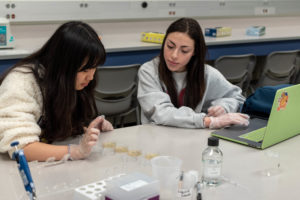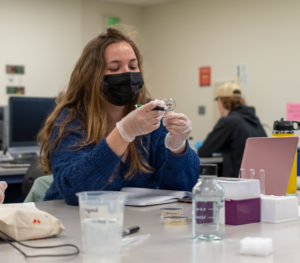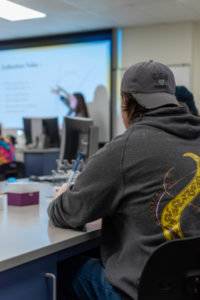
The scientific process involves a willingness to re-think, re-vamp and improve. The Colorado State University LIFE sciences faculty members demonstrate this through their willingness to adapt to changing student needs.
“I’ve been saying this to all my classes lately, that science is not about knowing, it’s about not knowing,” said Tanya Dewey, a research scientist in the Department of Biology. “That’s what makes it exciting, the process of discovery.”
The School of Global Environmental Sustainability has awarded a team from the Department of Biology the Sustainability Curriculum Innovation Grant to help them adapt to student demand for more education on sustainability.
Dewey, along with Kim Hoke, an associate professor, and Ren Hellmuth, a lab coordinator, were among the recipients of the grant for 2022.

The trio has been working to improve the lab sections for LIFE 102 and LIFE 103, and two introductory biology classes, by implementing more sustainability curriculum into the labs.
The teaching assistants in the labs provided feedback to Hellmuth, the LIFE lab facilitator, on what students seemed most interested in learning.
“One theme that emerged was that students were really interested in anything that was connected to larger real-world issues or things that were applicable to their lives,” Hellmuth said. “They’re really interested in things related to sustainability and conservation.”
The labs are also adapting to focus more on practicing scientific skills. Students no longer have printed worksheets and are instead asked to have a blank notebook.

“Filling in the worksheet is really different than what you do in a normal lab environment,” said Hoke. “This way, we can start asking students to do authentic science, even in their first semester in their labs.”
This change in format also allows labs to be more adaptive to alterations and additions to the curriculum.
“What we’re really hoping is to create a model where we’re kind of continually revising labs to be structured around issues that are of interest and that are topical, like sustainability,” Dewey said.
Normally, course revisions and revamps are implemented over the course of several semesters. However, because of COVID-19, Hellmuth, Hoke, and Dewey have been able to implement several changes to the lab sections much more quickly.
“Hopefully the sustainability development of the content should be done by the end of this semester, potentially going a little bit into the summer with piloting and tweaking,” said Hellmuth.
The goal is to start Fall 2022 with an established plan to implement a sustainability curriculum for the labs.